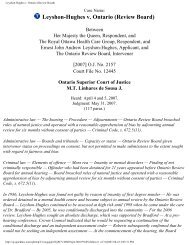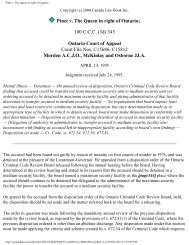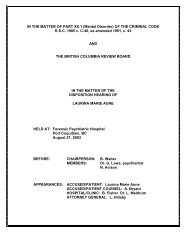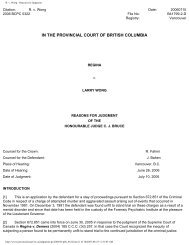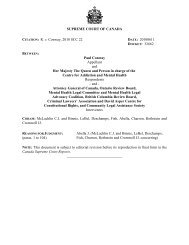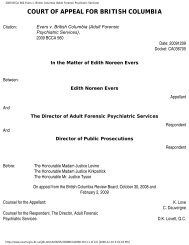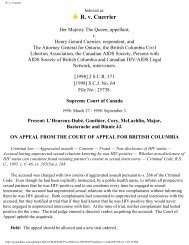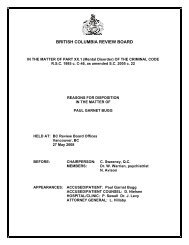LaFortune [LaFortunate] (Re) - British Columbia Review Board
LaFortune [LaFortunate] (Re) - British Columbia Review Board
LaFortune [LaFortunate] (Re) - British Columbia Review Board
Create successful ePaper yourself
Turn your PDF publications into a flip-book with our unique Google optimized e-Paper software.
<strong>LaFortune</strong> [<strong>LaFortunate</strong>] (<strong>Re</strong>)sufficient reason for finding her unfit to stand trial. As a result of some cause other than a mentaldisorder, many people have no memory of what transpired in a particular time frame, but this lack ofmemory does not preclude the holding of a trial. In R. v. Boylen (1972), 18 C.R.N.S. 273 (N.S.Magistrates Court), the accused claimed that a prosecution should not proceed because, due to aconcussion he had lost his memory, and he therefore could not make full answer and defence, and as aresult would be denied the right to a fair hearing guaranteed under s. 2(c) of the Canadian Bill of Rights.Magistrate Kimball rejected the claim, saying (at p. 278):The inability of an accused, who is otherwise normal, to recall events and to not be ableto instruct counsel as is normally done, in my opinion, does not deny him the right to afair hearing. It does not deny him the opportunity to exercise his right to examine andcross-examine witnesses or testify himself if he wishes to do so. If it were otherwiseloss of memory could become a very easy refuge for those persons who were otherwisefully responsible for the consequences of their acts. The fact that a person does notremember certain events does not mean he was not fully responsible for those eventswhen they occurred and, in the absence of the defence of insanity, in my opinion, heshould not be excused from that responsibility. 54 Even though R. v. Boylen was not a mental disorder case, there are good reasons for followingit in cases such as the present. If the rule were that "unfitness to stand trial" was established upon proofof the accused having no memory of the alleged crime or its surrounding circumstances on account ofmental disorder, it would mean that mentally disordered accused persons would have to be found unfit tostand trial even though in every other respect they were capable and anxious to proceed. This is anexample of what the Court of Appeal in R. v. Taylor meant when it warned about the danger of settingthe threshold of fitness too high (see supra). Moreover, where, as in Ms. <strong>LaFortune</strong>'s case, theprofessional evidence is that memory will only worsen with the passage of time, the finding of unfitnesswould almost certainly continue to apply; and, barring a stay of proceedings or a finding that the Crownno longer had a prima facie case, the accused would be subject to an order of the <strong>Re</strong>view <strong>Board</strong> for therest of his/her life, even if he/she was not a significant threat to the safety of the public and did notrequire psychiatric supervision. This would amount to imposing a life sentence of probation without thebenefit of trial. 55 The conclusion reached by the <strong>Re</strong>view <strong>Board</strong> is that although a lack of memory relevant to thealleged crime may be considered in determining whether an accused is unable on account of mentaldisorder to instruct counsel, it is not conclusive of the issue. The <strong>Board</strong> is satisfied that Ms. <strong>LaFortune</strong> iscapable of communicating with her counsel and any lack of memory she displays will not prevent hercounsel from presenting a defence. 56 Having found the accused, Corinne Cheryl <strong>LaFortune</strong>, to be fit to stand trial, the <strong>Re</strong>view <strong>Board</strong>therefore orders, pursuant to s. 672.48(2), that she be returned to the court for trial of the issue of fitness.QL Update: 20000911http://ql.quicklaw.com/qltemp/C2KEwCMAFbZMTYcs/00049bcrb-00000604%2ehtm (15 of 16)2007-08-21 1:59:51 PM


![LaFortune [LaFortunate] (Re) - British Columbia Review Board](https://img.yumpu.com/42779845/15/500x640/lafortune-lafortunate-re-british-columbia-review-board.jpg)
